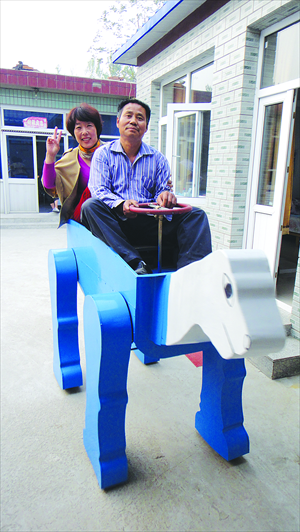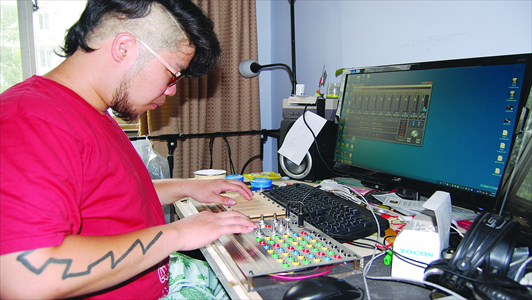Idea generation

Peasant robot maker Wu Yulu says young people need more hands-on experience. Photo: Courtesy of Wu Yulu
With a punkish hairstyle, glasses and a Taoist tattoo running down the sleeve of his right arm, 28-year-old Beijinger Meng Qi doesn't quite match up to how you might imagine a young Chinese inventor should look. But Meng is a full-fledged inventor of musical instruments - proof that at least some Chinese youth have a healthy appetite to make things. Or at least design them.
"Like I said, I didn't invent it," Meng says of the unique looking synthesizer directly in front of him. "I designed it. I redesigned in fact, it to be more musical not only for me but for a lot of users as well."
Two weeks ago, Meng - a self-taught electronic engineer with a high school education - demonstrated his homemade synthesizers in a seminar held by Beijing Makerspace, an organization that provides young Chinese a place to gather and build projects at a laboratory in Beijing's tech zone, Haidian district's Zhongguancun.
"We basically attract people who are interested in making things," says Melva Lai, 23, who works at the lab. "You can call them inventors."
Lai tells Metropolitan that Beijing Makerspace is the first organization of its kind in the capital, and is attempting to build a strong community where inventors can share what they are doing with audiences or students. "We want to encourage more people to join this maker movement," she says.
Normally, young people do not get a chance to build new things in the education system.
"There's hardly any opportunity to learn things like this in primary and secondary schools, even university," says Beijing Makerspace CEO Wang Shenglin.
But nonetheless, creative people, once isolated, are creating spaces for themselves.
Founded in 2011 by a group of tech enthusiasts, Beijing Makerspace has united the once scattered inventor community. The organization now has more than 200 members, says Lai.
Aspiring inventors can apply for grants, and Lai says that one day some of these makers might even be able to develop marketable versions of their inventions.

Inventor Meng Qi at work on his musical instruments. Photo: Jonny Clement Brown/GT


Meng Qi's creations. Photos: Courtesy of Meng Qi
Searching for creative space
Meng slides, taps and presses his fingers over a clear-cased circuit board box in his cluttered apartment in central Beijing. It's covered with touch-sensitive planes and colored plugs. Shifting electric pitches, wavering tones and percussion noises waft through the speakers on his desk. As he demonstrates his creation, Meng only pauses to tame his thick mane of black wavy hair.
Meng says that to date, he has made and sold three of these instruments, which he calls the sidqin. Other instruments he has built include an optical theremin, which plays notes based on light proximity - "you need a flashlight to play it," Meng explains - and a space kalimba, ostensibly an electrified thumb piano based on a South African instrument of the same name.
Meng says he now makes his living selling his homemade instruments with buyers from America and Germany putting in specific orders for Meng's products. But it hasn't always been easy.
"There is a steep learning curve to do DIY stuff," Meng says. "You need to buy a lot of stuff that you might not need later."
As a synthesizer instructor at the Beijing Contemporary Music Academy, Meng hopes to conduct similar workshops on technical and theoretical skills at the new Makerspace lab sometime in the future.
Asked if the emergence of Beijing Makerspace was indicative of new China's re-emergence as a nation of innovative and creative people, Meng said that a question of this scale is "too big" to answer.
Isolated inventors
It's not as if no one in China, home of the invention of gunpowder, paper, the compass and moveable block printing, lacks creative people. It's just that there has been no forum to connect them together. Years before Meng and his contemporaries had Beijing Makerspace to go to, Wu Yulu, a farmer, started making walking, talking robots. He was working alone, and considered so unusual he attracted significant media attention. These days, Wu gives seminars on mechanics to college professors and students from time to time.
Wu made his first robot in 1986. "I was very interested in making things and asked lots of questions," Wu told Metropolitan of his humble yet inventive beginnings.
"I looked at animals and wondered, 'Why do they walk on four legs and humans on two? Can I use machines to make them?' So I started experimenting," Wu explained.
Wu, now 52, has made more than 60 robots, some of which can pull carts, climb walls, write words and even serve tea.
"Initially I didn't have any intention of making a useful robot," Wu said. "I just found a feeling of accomplishment from having an idea and putting it into practice."
Wu's robots are on display all over the world, including Britain and Brazil. In 2010, his robots walked the opening ceremony of the Shanghai World Expo. The BBC even featured Wu in a documentary in 2007.
Wu never studied past elementary school level, but he now regularly teaches robotics.
Coming together
However, Wu laments that the students he teaches are lacking any real hands-on experience with making things. They lack the opportunity to do so, and the education system failed them.
"Once I met a recent college graduate with a degree in electronic engineering and he had no idea how to test an electric current with a contactor," Wu recalled. "He had never even seen a contactor. So I wonder what he learned in all those years of study," Wu said.
According to Wu, if you graduate without any of these skills you won't be able to find a job.
"A lot of companies would hire me now just for my abilities even though I don't have a college degree," Wu said.
Wu is not the only uneducated farmer to have caught the invention bug.
According to a 2011 CCTV report, Tao Xiangli, originally from a rural community in Anhui Province, constructed his own submarine on the outer edges of Beijing.
Other rural inventors with largely poor educational backgrounds have been featured on CCTV 7. Noting the number of people interested in making things today, Wu believes that places like Beijing Makerpsace will encourage creative development in China, since it brings people of similar interests together.
Last May several inventors showcased their work at Beijing's Maker Carnival, held in conjunction with Beijing Design Week. These projects ranged from a pen that draws automatically, to a wig that plays music according to how hard the wearer shakes his or her head.
For now, Beijing Makerspace will be enough for locals to get Wu's much valued "hands-on experience" that they might not have had at school, let alone the ability to freely experiment.
Some of the inventors at Makerspace "didn't make things before or they only had experience at school making projects based on what the professor told them," Lai says.
Now it seems, if you have an idea and want to make it, you have every opportunity to do so.
"Our goal is to encourage people to really make ideas happen," Lai says. "It's an open place where we share knowledge and interesting ideas."
Evelyn Cheng contributed to this story